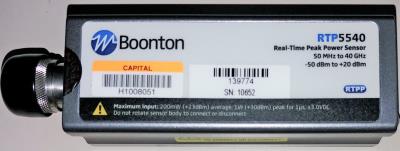
|
|
The Boonton RTP5540 Real-Time Peak Power Sensor offers high video bandwidth and fast rise times. It can deliver 100,000 measurements per second, with no gaps in signal acquisition and zero measurement latency. Combining this performance with automatic pulse measurements, CCDF and crest factor statistical analysis and multi-channel capabilities.
Specifications.
RF Frequency Range: 50 MHz to 40 GHz.
Average Dynamic Range: -50 to +20 dBm.
Pulse Dynamic Range: -40 to +20 dBm.
Internal Trigger Range: -27 to +20 dBm.
Rise time (fast/slow): 100 ns/<10 μs.
Video Bandwidth: 6 MHz/350 kHz.
Single-shot Bandwidth: 6 MHz.
RF Input: 2.92 mm, 50 Ω.
VSWR:
1.25 (0.05 to 4.0 GHz);
1.65 (4.0 to 38 GHz);
2.00 (38 to 40 GHz).
Sampling Techniques: Real-time/Equivalent Time/ Statistical Sampling.
Continuous sample rate: 100 MHz.
Effective sample rate: 10 GHz.
Time Resolution: 100 ps.
Statistical Analysis: Continuous or gated CCDF.
Statistical Speed: 100M points/sec.
Trigger Sources: Internal or External TTL.
External Trigger: in/out TTL in (slave) or out (master).
Minimum Trigger: Width 10 ns.
Maximum Trigger: Frequency 50 MHz.
Trigger Jitter: 0.1 ns rms.
Trace Acquisition Speed: 100K sweeps/second.
Measurement Speed over USB: 100K meas/sec (buffered mode); 800 meas/sec (continuous).
|